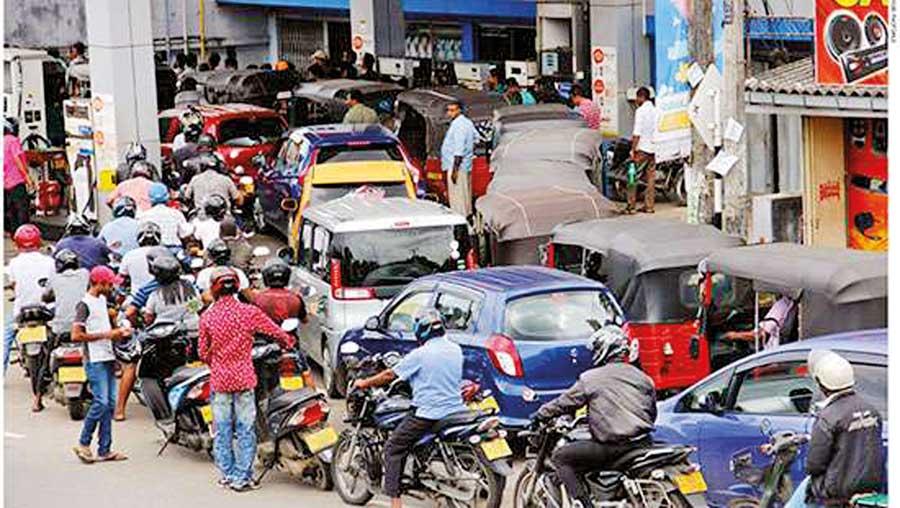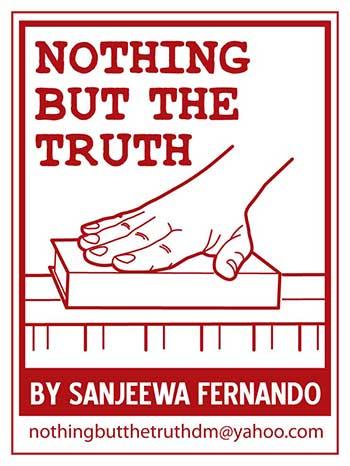Reply To:
Name - Reply Comment

Motorists form a long queue at filling stations, despite the government's sudden announcement of fuel price hike from Monday midnight. (File Photo)
Apocalypse does not point to a fiery Armageddon but to the fact that our ignorance and our complacency are coming to an end. Joseph Campbell
are coming to an end. Joseph Campbell
By all counts, the end is near. If it is not physical dissolution of the nation state, symbolically it will be. The territorial integrity and the sovereignty of the people of Sri Lanka is now in threat of being undermined, and this time it is neither the armed wing of the JVP nor the LTTE, neither the Portuguese, Dutch or the English. It is not the US, Russia, India or not even China. It is our own doing. Our leaders, our clergy, our teachers, our businessmen, our elders and us. For 70 years this has been hanging above us like the Damocles sword; yet each and every government, mostly those who came to power after 1977 have hoped that the ‘apocalypse of total breakdown’ would not occur during their tenure. Politicians of all regimes have fattened their bellies and purses while the country languished in economic stagnation and political instability.
The governments that came to power have tried their own brand of nation building, alright. When Sirimavo Bandaranaike introduced a closed economic model which sought to rely on domestic production by curtailing imports, the results were devastating. Firstly, the people were never ready to sacrifice as a generation so the future generations would benefit from it, as Japanese did in the decades after World War II. Secondly, the leadership consisting of the elite were hardly the type that could inspire the grass root citizen to sacrifice and abstinence. Neither Sirimavo nor the coalition leadership could lead a great battle of deprivation. They were by no means Ho Chi Minh’s of Vietnam.
Excessive Consumerism
The Open economy model introduced by J. R. Jayewardena, was the catalyst for opening up of Sri Lankan market for foreign goods in an unprecedented manner. The excessive consumerism of the open economy saw that we were spending way more than our income would permit as a nation. For a nation that has once been more or less self-sufficient, but went into deprivation due to colonialism and then a closed economic model from 1970-77, all prudence of spending and buying was non-existent with the onslaught of fancied goods from foreign markets. The Trade balance which, although not great but was agreeable, started turning in to a deficit, ever widening with every year, until a never ending and inescapable debt cycle emerged. It was firstly the US and Europe from whom we obtained loans, in the form of IMF and World Bank loans. Even during the eighties and the nineties the foreign debt issue was campaigned in the political stage, in election campaigns, in leftist politics as well as academic debate. Yet no government, ever took any meaningful step in the direction of curtailing borrowing. Instead they were intent of paying up the loan instalments that fell due in billions every year. Even new borrowings were aimed at servicing obtained debt rather than on investment.
The borrowing frenzy
Borrowing in itself is not bad. Even global economic giants take loans. But they spend it on massive projects that strengthen their manufacturing, agriculture, power generation, infrastructure building that supports their businesses. But Sri Lanka kept on borrowing without proper policy on nation building. Firstly, it was the political ambition of leaders or parties without consultation with relevant parties who could objectively identify what was needed by way of boosting our economy. Secondly, it was corruption of astronomical levels including commission, bribery, kickbacks that dominated these borrowings where politicians were happy to borrow regardless of where such borrowed money went. Every instance of heavy borrowing in decades gone by, had enriched the politicians and the higher officialdom involved. So why should they worry whether it was well taken or not?
Well, that is from the politician’s side; one may add the top bureaucracy to that as the distinction between politicians and the top officials has now been obliterated due to politicisation of the public service beyond recognition. What about the people? What about the so called people who hold the sovereignty of their country in their own hands? The ones who elect their kings and princes? Are they totally blameless so that they could be called the innocent victims?
Electoral misdeeds
They are also responsible for the apocalypse that is looming. The citizens have always misbehaved electorally when choosing their leaders. They have always been indiscreet, illogical and idiotic in their choices. They have always considered their own petty benefits over the collective good as a nation. They have hardly held their leaders accountable after electing them. They have rarely questioned their elected representatives while they are at work. They have opted to either stay silent or worse, be the beneficiaries of the corrupt dealings of their political bosses, which trickles down to the lower levels. They were content if their public representative put their child to a school, got a job for their son, and gave some materials to build a house, while engaging in corruption, mismanagement and excesses. In the meantime, the ordinary man of the public too engages in their miniature acts of corruption, cheating, law breaking, and bribery; from fraudulent document-making to admit a child to a school to oiling the palm of a technical officer to get the building plan passed. Yet they shout that the Yugadanavi deal or the Central Bank Bond scam are corrupt or fraud.
Political roots
The pending disaster with our dollar reserves drying up, debt servicing becoming impossible and domestic prices skyrocketing might seem an economic issue. It is, without a doubt. But there are unmistakable political roots that led to this doomsday scenario. At the beginning of the root are the public themselves with their self-destructive attitude. They were all reluctant to work in the field, factory or workshop, wanting only easy, chair-warming jobs that required little hard work. They flocked to public service which is one of the most unproductive and corrupt in the world. Even in the private sector jobs they prefer easy jobs as opposed to challenging ones. None are interested in jobs in the production, manufacturing or agricultural sector. As we have always said in these columns, an expansion in the Service sector in the GDP means very little if industry and agriculture does not improve. The parents want their children to become Doctors, lawyers, Accountants, which hardly contributes to the economy in a meaningful manner in the short run. An archaic and colonial attitude of despising manual labour exists and is reflected in the collapse of manufacturing and agriculture.
In short, the citizens themselves were minions of the putrid aberrations their elected representatives have turned out to be. If the politicians are responsible for the mayhem Sri Lanka faces today, the citizenry are the principals of that crime. The Rajapaksa government will search high and low to escape the economic and financial crisis that will make landfall cometh January and February next year. They might even succeed temporarily.
But unless we change our attitudes, all we have, will be the familiar big talk about that ‘2500 year old’ something. We have no future at all. Our ignorance and our complacency are coming to its natural end!